Burt Bacharach
May 12, 1928 - February 8, 2023
I don't think it's entirely my fault that, even to this day, a part of me still thinks Cole Porter looks like Cary Grant, Frédéric Chopin is a ringer for Cornel Wilde, and Franz Liszt strongly resembles Dirk Bogarde. The Hollywood biopic tradition of assigning an outrageously glamorous face to the largely faceless profession of composer is a sound one. It aligns the artist with the art. And in a world of image, mythmaking, and marketing, it's a distinct branding advantage when an artist "looks" like the art they create (e.g., Hemingway, Warhol, Halston). So who can blame the movies for their insistence that the composers of romantic music also possess romantic looks?
Which brings me to composer, arranger, songwriter, producer, pianist, and all-around legend, Burt Bacharach.
As lyricist Sammy Cahn once famously remarked, Bacharach's atypically high professional visibility was owed to his being "the first composer who didn't look like a dentist" (the most visible pop composer I can remember as a kid was Henry Mancini, so, point made). Bacharach, who started his career in the '50s looking like a thick-necked college jock who'd accidentally stumbled into the music department on his way to the athletic field, looked nothing like his peers. But then his music didn't sound anything like theirs, either.
Whether lushly romantic or go-go groovy, Bacharach's fiercely inventive musical style was all about where the world was headed, not where it had been. Bacharach's appearance, natural charisma, and virtuoso talent as a pianist (his thin, uniquely inflective voice sealed the deal) led him to an unexpected performing career. By the '70s—via concerts, albums, TV specials, and a seemingly unbroken chain of hits sung by Dionne Warwick—Burt had become a global household name and distinguished himself as the marketable face of the Burt Bacharach/Hal David songwriting team. Wed to glamorous movie star Angie Dickinson in 1965 (the illusion of their marriage immortalized in those iconic Martini & Rossi ads), Burt, as the tan, blow-dried, turtlenecked embodiment of California hip, came to look exactly like his music sounded: laid-back, sophisticated, sexy, and smooth.
 |
| Ken's Top 10 Casino Royale Are You There With Another Girl? Close To You Walk On By Anyone Who Had a Heart Promises, Promises Alfie Reflections Something Big Message To Michael |
Though I'd grown up hearing Burt Bacharach's songs on the radio for years without knowing it, my first real awareness of him was when I was ten years old and fell in love with his score for the chaotic James Bond spoof Casino Royale (1967). In all these years, it has never been surpassed as my favorite movie soundtrack album of all time.
I've been a devoted (some might say obsessive) Burt Bacharach fan ever since. Given the many years and blissful hours I've spent surrounded by his fabulous library of songs--dancing to them, dreaming to them, crying to them; it's not an overstatement to say the music of Bacharach/David has been the soundtrack of my youth.
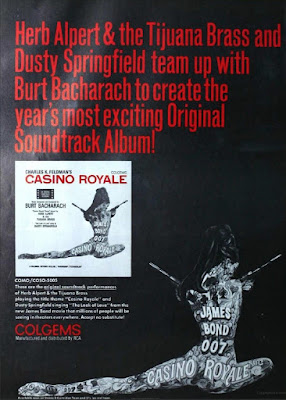 |
| Billboard Magazine -April 19, 1967 |
So, in keeping with the soundtrack emphasis…
Since there's already so much out there about Bacharach's radio and album hits, my cinephile tribute to the late-great Burt Bacharach--3-time Oscar-winner, six-time Grammy-winner, 1972 inductee to the Songwriters Hall of Fame, 2008 Grammy Lifetime Achievement Award, and #32 in Rolling Stone's 2015 Top 100 Greatest Composers of All Time list—is to comprehensively highlight all the music and songs he wrote specifically for the movie screen.
COMPLETE FILM SCORES - 12
 |
| What's New, Pussycat? - 1965 - Bacharach/David |
 |
| After The Fox - 1966 - Bacharach/David |
 |
| Casino Royale - 1967 - Bacharach/David |
 |
| Butch Cassidy & the Sundance Kid - 1969 - Bacharach/David |
 |
| Lost Horizon - 1973 - Bacharach/David |
 |
| Together? (Amo Non Amo) - 1979 - Bacharach/Anka |
 |
| Arthur - 1981 - Bacharach/Sager/Cross/Allen |
Bacharach won his third Academy Award for "Arthur's Theme (The Best That You Can Do)," a song written by four people, and sung by Christopher Cross over the closing credits. If this Best Song Oscar-winner and Song of the Year Grammy nominee appears elsewhere in the film, I'll never know, because when it comes to watching Arthur, one is my limit. And perhaps it proves I'm not a full-tilt Bacharach maniac when I say this song has never done a thing for me. Its popularity baffled me even in 1981. Bacharach composed the film's instrumental score (by himself, I should add), which features a few songs co-written with Carol Bayer Sager...Bacharach wife number three (of four).
 |
| Night Shift - 1982 - Bacharach/Sager/Ross |
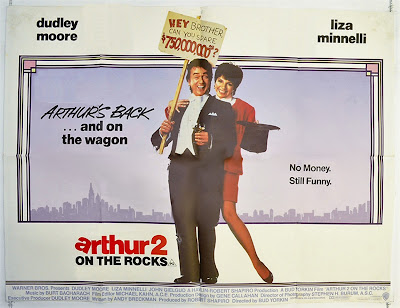 |
| Arthur 2: On the Rocks - 1988 - Bacharach/Sager/De Burgh |
 |
| Love Hurts - 1990 - Bacharach |
I had never heard of this movie before (it was released overseas but went straight to video in the U.S.). Bacharach contributed no songs to the score, but I understand his instrumental tracks are sprinkled sparsely throughout the film.
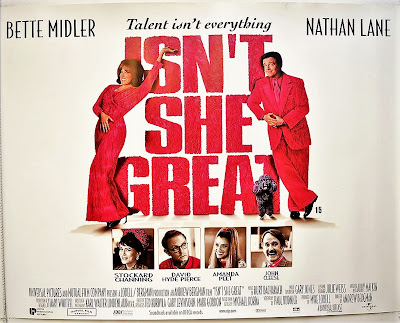 |
| Isn't She Great - 2000 - Bacharach/David |
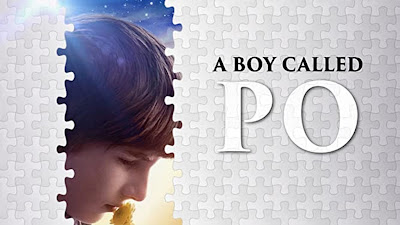 |
| A Boy Called Po - 2017 - Bacharach |
His first complete film score in 17 years, Bacharach dedicated this movie about autism to his daughter Nikki, who struggled all her life with issues related to her undiagnosed autism and committed suicide in 2007 at age 41. An obvious labor of love, Bacharach donated his talents to the project, played the piano himself on the score, and even secured the licensing rights to "Close To You" for director Joseph Bauer for just $400. Bacharach also composed a song with Billy Mann, "Dancing With Your Shadow," that can be heard sung by Sheryl Crow over the closing credits.
TITLE AND THEME SONGS - 37
 |
| DON'T KNOCK THE ROCK (1956) - "I Cry More" - Alan Dale LIZZIE (1957) - "Warm and Tender" - Johnny Mathis |
 |
| THE SAD SACK (1957) - "Sad Sack" - Jerry Lewis COUNTRY MUSIC HOLIDAY (1958) - "Country Music Holiday" - Bernie Nee |
 |
| THE BLOB (1958) - "The Blob" - The Five Blobs (Bernie Knee) JUKE BOX RHYTHM (1959) - "Make Room for the Joy" - Jack Jones |
For years, I watched the Steve McQueen, Helen Krump (Aneta Corsaut) sci-fi horror flick The Blob without knowing its comically ill-suited, uptempo mambo theme song was composed by Bacharach/David. An entertainingly amusing tune that perhaps takes itself no more seriously than the film it introduces.
 |
| LOVE IN A GOLDFISH BOWL (1961) - "Love in a Goldfish Bowl" - Tommy Sands RING-A-DING RHYTHM (1962) - "Another Tear Falls" - Gene Daniels |
 |
| FOREVER MY LOVE (1962) - "Forever My Love" - Jane Morgan WONDERFUL TO BE YOUNG (1962) - "It's Wonderful to Be Young" - Cliff Richard |
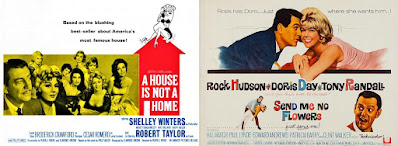 |
| A HOUSE IS NOT A HOME (1964) - "A House is Not a Home" - Brooke Benton SEND ME NO FLOWERS (1964) - "Send Me No Flowers" - Doris Day |
 |
| ALFIE (1966) - "Alfie" - Cilla Black / Cher |
 |
| MADE IN PARIS (1966) - "Made in Paris" - Trini Lopez PROMISE HER ANYTHING (1966) - "Promise Her Anything" - Tom Jones |
 |
| THE APRIL FOOLS (1969) - "April Fools" - Dionne Warwick LONG AGO, TOMORROW (1971) - "Long Ago, Tomorrow" - B.J. Thomas |
I've always loved the lilting quality of the beautiful song, "April Fools" (which plays during a montage sequence and again under the closing credits). It's one of Bacharach/David's most lushly romantic compositions. Though the score for The April Fools was composed by Marvin Hamlish, another Bacharach song- "I Say a Little Prayer for You," pops up during a party scene.
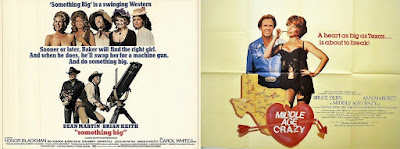 |
| SOMETHING BIG (1971) - "something big" - Mark Lindsay MIDDLE AGE CRAZY (1980) - "Where Did The Time Go" - The Pointer Sisters |
 |
| MAKING LOVE (1982) - "Making Love" - Roberta Flack ROMANTIC COMEDY (1983) - "Maybe" - Roberta Flack & Peabo Bryson |
 |
| TOUGH GUYS (1986) - "They Don't Make 'em Like They Used To" - Kenny Rogers BABY BOOM (1987) - "Ever Changing Times" - Siedah Garrett |
 |
| GRACE OF MY HEART (1996) - "God Give Me Strength" - Kristen Vigard STUART LITTLE (1999) - "Walking Tall" - Lyle Lovett |
ACADEMY AWARD TALLY 6 nominations / 3 Wins
What's New Pussycat (1965) Best Song nominee
Alfie (1966 ) Best Song nominee
Casino Royale (1967) Best Song nominee
Butch Cassidy (1969) WON Best Song & Best Original Score
Arthur (1981) WON Best Song
EXPLOITATION SONGS - 12
A song written to publicize a movie on the radio but is not in the film
 |
| The Desperate Hours - 1955 - Bacharach/ Wilson Stone |
 |
| Hot Spell - 1958 - Bacharach/Mack David |
Sophia: "There’s a hurricane a-comin’!”
Dorothy: “ ‘A-comin’?”
Sophia: “That’s right. People only use the 'a' when a really bad storm is a-comin' or a-brewin.’”
The above exchange from The Golden Girls partially explains why Miss Whiting reverts to dialect --"All that's a-comin' is a hot spell!" -- during the refrain of this enjoyable, western-trot anthem to lustful longing.
 |
| The Hangman - 1959 - Bacharach/David |
Actor John Ashley has long been a familiar face to me from those Annette & Frankie Beach Party movies. I had no idea he had a career as a pop singer and introduced TWO (not particularly distinguished) Bacharach/David songs.
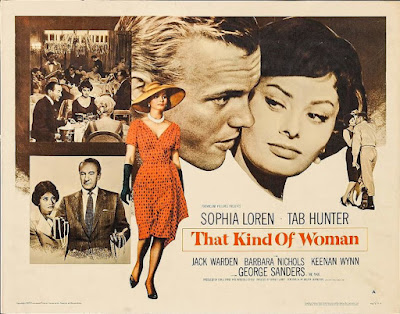 |
| That Kind of Woman - 1959 - Bacharach/David |
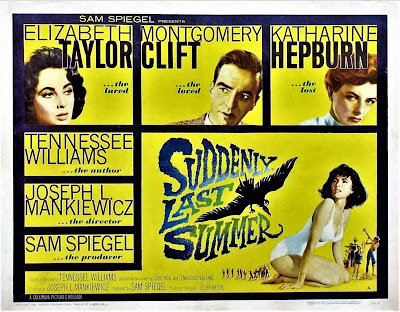 |
| Suddenly, Last Summer - 1959 - Bacharach/David |
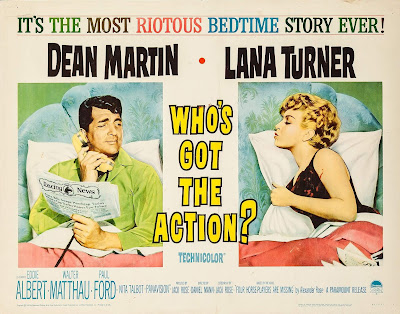 |
| Who's Got the Action? - 1962 - Bacharach/Bob Hilliard |
 |
| The Man Who Shot Liberty Valance - 1962 - Bacharach/David |
Okay, is this catchy, Western-pop narrative tune not THE best exploitation song ever? It sparked my interest enough to get me to sit through this gunslinger soap. I was very disappointed that the song never turned up in the movie.
 |
| Wives & Lovers - 1963 - Bacharach/David |
Bacharach's music is so good on this song that it almost makes you forget the cringingly sexist lyrics. Putting the words in a woman's mouth (as with Warwick's sublime version) softens the eye-rolling a bit, but Bacharach's full instrumental version is primo Bacharach.
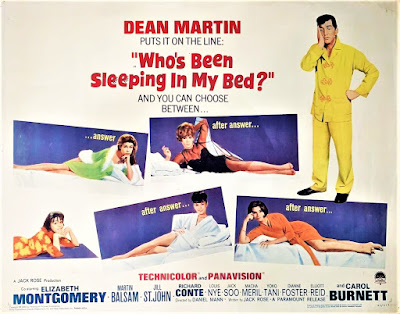 |
| Who's Been Sleeping in My Bed? - 1963 - Bacharach/David |
Song: Heartlight Sung by: Neil Diamond
As this was written more than a month after the Steven Spielberg film was released, it's more a tribute song than an exploitation one. But that's not how Universal Studios saw it. They sued the trio for $25,000. Something Bacharach in his 2013 memoir Anyone Who Had a Heart claimed to still irk him many years later.
FILM APPEARANCES
The Austin Powers trilogy of spy spoofs introduced Burt Bacharach and his music to a new generation. (Casino Royale's "Look of Love" inspired its creator Mike Myers). Bacharach made cameo appearances in each film.
HONORABLE MENTION
 |
| "Nikki" - 1966 - Bacharach/David |
BONUS MATERIAL
For all the individual achievement reflected by Burt Bacharach's fitting dominance in this tribute, I must make clear that as far as I'm concerned, there IS no Burt Bacharach without lyricist Hal David (May 25, 1921 – Sept. 1, 2012). And (in my life, at least) there would be NO Bacharach/David without Dionne Warwick. Having the opportunity to see her perform last year and hear her singing songs born of this genius trio's longtime collaboration was one of the premier experiences of my life. 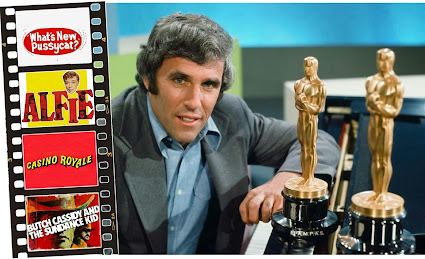










Scrolling down this post one
ReplyDeletecan only think, what didn't he write?
Yes, our lives would've been far emptier without his glorious music. I don't know that I could ever choose a favorite, though Promises, Promises is important to me & I don't know why.
Always enjoyed how the
"4th" (Peter Allen) on Arthur's Theme, snuck in.
And, no doubt you read Carole's book. Alas, brilliant people are often missing other traits, which can make them brilliant at their craft yet awful with people.
Hello normadesmond - "What didn't he write?" Indeed! The joyous rabbit hole this topic led me down introduced me to more undiscovered favorites from this prolific and popular composer than I thought possible. Just his film-related output alone is breathtaking.
DeleteNice selection with "Promises, Promises"! I purchased Dionne Warwick's "Promises, Promises" album when I was 11, so that is definitely a song I, too, rank as a favorite.
The story of how four writers piggybacked on "Arthur's Theme" is more entertaining than the song itself.
And yes, I read Sager's memoir, followed by Bacharach's equally revealing as-told-to autobiography. A memoir that surprised me with its inclusion of sizable, even damning quotes from all of Bacharach's wives...representing a united front that wouldn't be nominating Burt for any "Husband of the Year" awards in any hurry.
Which makes me grateful the influence and legacy of art has never been reliant on the likability of an artist.
Thank you for commenting on this post. I wholeheartedly concur with your observation that our lives would be a lot emptier without Bacharach's glorious music. Cheers!
Hi Ken.
DeleteSince you're a dancer, I'm curious what you thought of "Turkey Lurkey Time." Bacharach didn't write "dance music," and yet this crazy nonsense song full of non-stop sixties bacchanalia-by-way of Broadway must have been a dream come true for Michael Bennett.
Hi Kip –
DeleteThank you for bringing up one of my TOP top Bacharach favorites! The entire score of PROMISES,PROMISES deserves a tribute page.
Because it fell beyond the scope of the "movie" theme of this post, it pained me that I couldn’t find a way to shoehorn in a reference to "Turkey Lurkey Time” (an early draft mentioned the song and musical number being faithfully recreated in the movie CAMP-2003).
You’re right, Bacharach didn’t write many songs you could dance to, but when he did (Little Red Book, Promise Her Anything), I was ever so grateful that his groove was stuck firmly in the era og the frug and the watusi.
"Turkey Lurkey Time” is an infectiously fun, catchy, and exhilaratingly silly song magnificently realized by Michael Bennett’s brilliantly staged and choreographed number. The song was a favorite of mine since I was a kid and saw the number performed on The Ed Sullivan Show (I never saw the Tony Award performance with Donna McKechnie until YouTube unearthed it).
When, many years later, I choreographed a routine to it for my dance class, it’s only then I realized what a marvel Michael Bennett had achieved. It's HARD to choreograph to Bacharach!
Most dancing I taught numerically, in counts of 8. Bacharach’s music is famously quirky and doesn’t adhere to strict 32-beat phrases. So through Bacharach, I learned how to choreograph and teach to the music, not the counts.
And as for Bennett, you’re right when you say that it was a special number for it. Though it had a rocky path to the stage, it ultimately became such an iconic showstopper that (according to Harold Wheeler, the musical director) for many years after, when Bennett wanted to impress upon his collaborators that a musical number had to stop the show, he would reference "Turkey Lurkey Time”( “The ending has to be like ‘Turkey Lurkey’” ). I still get such a kick out of that song. And my partner never fails to crack up at Hal David’s appropriately silly lyrics.
Thank you SO much, Kip, for providing the opportunity to bring one of my enduringly favorite Bacharach songs into this tribute. Always appreciate your contributions and returns to this blog.
On youtube and certain Broadway websites, talking about "Turkey Lurkey Time" is pretty much a light industry. The funniest recollections are by Kelly Bishop of "A Chorus Line" and Gilmore Girls fame, talking about how everybody in the dancing cast except Donna McKechnie had to regularly visit chiropractors because of the abuse done to their necks, shoulders and spines.
DeleteI can believe it! It hurts just to look at some of those head releases hurts ("Don't pop your head, Cassie!"). It's remarkable that Turkey Lurkey Time has endured. All the more so because, per his memoirs, Bacharach almost died from overwork while mounting "Promises, Promises."
Delete" it's not an overstatement to say the music of Bacharach/David has been the soundtrack of my youth." Mine, too. Though I didn't realize it. Until now, I had no idea how prolific Bacharach had been. I vividly remember the first time as a kid hearing "Raindrops Keep Falling..." (on the radio) and loving it. And was shocked when it showed up in "Butch Cassidy and the Sundance Kid" (I just didn't track that kind of stuff when younger). Only recently did I finally hear "Message to Michael" (on Youtube) and now I know why I liked it. And he wrote "Send Me No Flowers"! I had no idea. You only left off one song that I would definitely have mentioned: Herb Alpert's "This Guy's in Love With You." It's a lovely song that's not at all hard to sing (Herb Alpert had a limited range) that still goes to some great emotional places. Great post! I really appreciate this retrospective of his career.
ReplyDeleteHi Ron -
DeleteLike you, I think a lot of folks who were kids or grew up in the '70s never really knew how MUCH Bacharach was a part of their life. So many of his songs became singer-identified signature tunes. In my case, I so identified the singer with the song that, in some instances, I attributed its composition to the wrong people (for example, when they first came out I thought "Close to You" was written by The Carpenters and that singer-songwriter Jackie DeShannon wrote "What The World Needs Now").
I think your experience with "Raindrops" is common (familiar with it from the radio and being surprised when it popped up in a movie). My own experience of being shocked that Bacharach wrote my favorite Doris Day title song, "Send Me No Flowers," is one of the reasons I wanted to compile a comprehensive list of his film work. IMDB is thorough, but tough to navigate because movies that simply licensed Bacharach's music are lumped together with those he composed for.
I'm glad you mentioned "This Guy's in Love With You" as a favorite, and I hope others chime in with their faves, as well. I've always loved that song, too. As you say, it's a simple song, but emotionally, it packs a wallop.
I found out early that when it comes to citing favorite Bacharach songs, it’s impossible to be a completist; he wrote so many great songs that any list you make, no matter how long, is going to leave out another favorite that has happened to slip your mind.
Even the somewhat limited scope of this post reveals such a jaw-dropping amount of brilliant work.
As ever, Ron. I'm always appreciative of your reading so many of my posts and contributing so thoughtfully and considerately. Thank you so much!
I am so startled that Burt had a career this encompassing! I for the most part only think of the 1960s when his name comes to mind. A few later things, too, of course. I especially loved finding out about the "exploitation" songs. Who knew that two Bacharach songs had been sung by JOHN ASHLEY?!? My own first exposure to him was in those "Martini & Rossi, on the rocks, say yeah..." TV commercials! I thought he was very arresting looking as a kid. And married to "Pepper Anderson!" Ha ha! That music with David, sung by Dionne, is just so classic.... But I can never think of it now without recalling a hysterical remark Dionne once made. Apparently, many of those numbers were redone and released in the UK by one Cilla Black, who stuck close to Dionne's style/phrasing. She said something to the effect that Cilla mimicked her so stringently that if she had accidentally coughed on one of the recordings, Cilla would have incorporated it!! HA HA!! I never went to the trouble of trying to look them up and listen to any, though... Lastly, YES, the song "The Man Who Shot Liberty Valance" is so fun...! Love it. Thanks for this post. (Poseidon3)
ReplyDeleteHi Jon – My God…the scope of this man's work is pretty breathtaking. No wonder he was married four times…when was he NOT at the piano?
DeleteI'm with you in largely thinking of the '60s and '70s when it comes to Bacharach. I can't speak for any of the pop songs he wrote in the later years, but movie music in the '80s and '90s leaned so heavily into those awful, sound-alike ballads, I tend to be not so crazy about the post-70s stuff. (And when I say that, it's largely a did at his lyricist collaborators. I think Burt's melodies are often beautiful during this era, but OH! The banal lyrics of so many of those songs!)
And Im just as surprised as you that John Ashley introduced not one, but TWO Burt Bacharach songs! I remember him from beach party movies exclusively, and before researching this piece, never knew he had a singing career.
Those Martini & Rossi commercials were burned into my psyche as a kid, too. He and Angie looked so outrageously happy and Hollywood-perfect that I was kind of shocked to learn from his memoirs that he says the marriage might never have lasted more than nine months were not for their child, and that it had to be put into their Martini & Rossi contract that he and Angie weren't going divorce during the run of the ad campaign (!)
I love that Cilla Black anecdote! (I can picture Warwick in full "I see you, hussy" mode while telling it). Bacharach's memoir refers to what seems to have been an ongoing antipathy between Cilla Black & Warwick dating back to 1963 when Warwick had a US hit with "Anyone Who Had a Heart" and was about to release the single In Britain when Cilla Black released a cover that "jumped the gun" on Warwick and became a UK hit.
Thank you so much for contributing that hilarious story and for always checking out my posts. You and I go waaaay back! Cheers!
Ken, this was a treasure trove. I spent over an hour on YouTube listening to these songs. My God, IMDB lists only a fraction of Bacharach’s work. I see many commenters feel the same way – as in “I had no idea.” When I was a kid I used to record movie theme songs off the television set on my rickety tape player. Two of my all-time favorites ( there was a lot of spinning around in my bedroom and clawing at the air like Ann-Margret) were “Promise Her Anything” and “Made in Paris.” It’s not until this post that, well, I had no idea they were Bacharach songs. And wow, the “Exploitation Songs” are a absolute revelation. Thank you so much!
ReplyDeleteHi Max –
DeleteThe compiling of this list put me in the same boat. It sent me to YouTube to listen to many sensational Bacharach songs I’d never heard. And in the process, I had many “I had no idea” moments when it came to his film music output (I found IMDB’s credits for Bacharach to be complete but unwieldy to impossible to wade through).
Absolutely love that you recorded movie theme songs off of the TV to a tape recorder—something I did as well, mostly with the songs from movie musicals. Better still, you liked two of my favorite of his frothier movie themes Promise Her Anything” and “Made in Paris”! Both of those can’t-sit-still favorites do indeed conjure up images of Ann-Margret, whose frenetic, cat-scratch style of go-go dancing was tailor-made for that type of music.
I’m pleased you enjoyed the post enough to seek out some of the songs. I hope you found a new favorite or two.
This whole project really increased my appreciation of the scope of Bacharach’s creativity and musical genius. Thanks so much for reading and commenting, Max!
Adding most of these to my to watch list.. not bad for "the first composer who didn't look like a dentist".. great review.
ReplyDeleteHello Gill! And thank you.
DeleteThere're quite a few titles I'm unfamiliar with here as well. I think the Romy Schneider feature with the terrible title-"Forever My Love" is the most intriguing to me, next to those teen pop musicals which are usually terrific time capsules of camp.
To say Bacharach was prolific seems a huge understatement! Thank you so much for reading this and commenting. Hope you're well!
I am so glad you mentioned Romy, I have recently seen her in a film set in Scotland from her later career which her son starred in. So now keen to see her with HB and M. Delon.. but don't know where to begin.. any suggestions?
ReplyDeleteHello, Gill!
DeleteI think Romy Schneider is fabulous, but I haven't seen her in that many films. I think you may have already seen it, but LUDWIG (1973) is a beautiful movie. And then I fell in love with Romy in "The Swimming Pool" (1969) which is sort of the epitome of her pairings with Alain Delon. I'm not sure if you're familiar with or like Fabio Testi (the strikingly handsome actor from THE GARDEN OF THE FINZI-CONTINIS) but Schneider appears with him in a favorite of mine titled THAT MOST IMPORTANT THING LOVE.
It's fun exploring the filmography of a newly appreciated actor. Happy hunting!
Thanks I will certainly give these a look.. she certainly got her luck with handsome on screen love interests.
DeleteJust saw that Dionne Warwick is finally getting the Kennedy Center Honor later in the year.
ReplyDeleteI was thrilled when I'd heard about that, too. December 3rd, I believe. It's a marvelous thing when an artist you've loved since childhood has the longevity of career to achieve true legend status. And for her to be so honored is both a long time coming and so well-deserved.
DeleteAlthough the "Arthur's Theme" is credited to four people, it was written solely by Bacharach and Carole Bayer Sager. I was working for Bacharach's attorney for the time and did the copyright and ASCAP registration paperwork on the score. Carole Sager had written the line "When you're between the moon and New York City" in a song she co-authored with Peter Allen. Once a song is copyright, it is a joint property. The composer can't take the music back and the lyricist can't take the words back. The two own the composition together equally, like spouses owning a house. One of them can't take the second story and leave -- the house is indivisible, as is a song. So a deal had to be made with Peter Allen. I believe he received 16-2/3% of the income. Christopher Cross received an old-fashioned cut-in like they used to give Al Jolson and Elvis Presley, even though they never wrote a note. The fact that they were performing the song was considered so valuable that they were given a piece of the publishing. I believe Cross also got 16-2/3%, and Bacharach and Sager each owned 1/3. Nobody should get the idea that such a song requires four writers. Or that Christopher Cross, now virtually forgotten, was some kind of creative force.
ReplyDeleteThank you very much for contributing such a detailed, insider clarification of the "Four on a Song" (per Bette Midler) legacy of "Arthur's Theme." It’s quite something to have—at last-- some light on what always seemed like a curiously overcrowded credit list for such an undistinguished (to me, anyway) song. Both Bacharach and Bayer Sager confirm what you say in their memoirs, only with so much subjective resentment (particularly on Burt's part) that I didn't feel comfortable repeating it as fact. You've explained a great deal in a way that makes sense. It’s a bonus that all the behind-the-scenes machinations of copyright ASCAP law are informative, educational, and terrifically eye-opening. Much appreciated!
DeleteWonderful summary of Bacharach's film work...thank you for posting. One minor correction is that "The Desperate Hours" was recorded by Eileen Rodgers in 1955, and the Mel Tormé song "These Desperate Hours" was actually not written by Bacharach and was written and recorded by Tormé in 1960 for Tormé's guest appearance on the television show "Dan Raven". Details are here: https://www.bacharachonline.com/phpBB/viewtopic.php?t=9244
ReplyDeleteWell, whaddaya know! That's a fabulous bit of internet sleuthing there. One that corrects a long-repeated research error. Thanks very much for providing the new correct information ( I get to discover a heretofore unknown Bacharach song!), reading this post, and for your kind compliment. Cheers!
DeleteChildhood memories of 1969-1971, back then Bachrach's music was everywhere, not just just Jimi Hendrix, Janis Joplin or the Doors. I can remember being in my dad's 1962 Ford Galaxie convertible as he drove us down the 5 fwy in Orange County CA from Orange to Costa Mesa and listening to "Do You Know the Way to San Jose", "This Guys in Love with You", "A House is Not a Home" and other songs on the cars Philco radio. Or at night on the way to the Orange, Harbor or Highway 39 drive-in movie theaters.
ReplyDeleteWhat a time it was and definitely an incredible time for all sorts of music. -Rj
That's just it...Bacharach was the soundtrack to an entire generation. Years before Blondie's "Call Me' made me aware that there was such a thing as Convertible Music, Bacharach's tunes were ideal driving music for West Coasters who spent so much time on those networks of freeways.
DeleteYour memories (great to be reminded that Bacharach's sound was simultaneously popular with the rock music so many associate with the time) do a terrific job of clarifying that. Thank you for sharing them, RJ. And thanks very much for reading this post. Cheers!